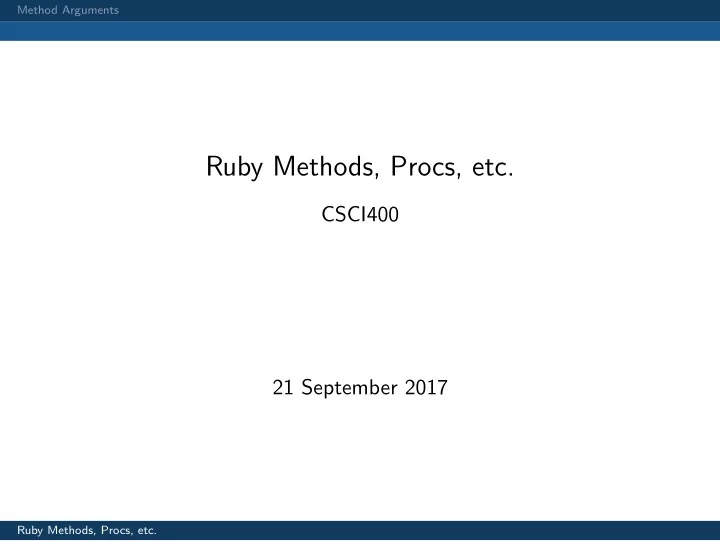

Method Arguments Ruby Methods, Procs, etc. CSCI400 21 September 2017 Ruby Methods, Procs, etc.
Method Arguments Color Key • Clickable URL link • Write down an answer to this for class participation • Just a comment – don’t confuse with yellow Ruby Methods, Procs, etc.
Method Arguments Brief Refactor Exercise (1/2) def fib(limit) yield 1 yield 1 a = 1 b = 1 while (i < limit) t = a a = a + b b = t yield a i = i + 1 end end Ruby Methods, Procs, etc.
Method Arguments Brief Refactor Exercise (2/2) def fib(limit) a, b = 0, 1 (1..limit).each do a, b = b, a + b yield a end end 11 lines → 4 lines (of actual logic/content) Ruby Methods, Procs, etc.
Method Arguments Topics • Method arguments • Some new, some review • Proc Ruby Methods, Procs, etc.
Method Arguments Method Arguments Ruby Methods, Procs, etc.
Method Arguments Overview • Default value • Recall: Hangman.new vs. Hangman.new "myWords.txt" • Variable number of arguments • def readwrite(*syms) • Pass arguments in Hash • Block as function argument • When method has yield Some of this section is review, and some is new Ruby Methods, Procs, etc.
Method Arguments Default Value (1) def title(name, len=3) name[0, len] end puts title("Mr. Brandon McCartney") puts title("Mrs. Doubtfire", 4) Ruby Methods, Procs, etc.
Method Arguments Default Value (2) # can use expression in default value def shift(x, dx=x/100.0) x + dx end puts shift(5) puts shift(10, 1) Ruby Methods, Procs, etc.
Method Arguments Variable Argument Count • Similar to * ( splat ) • a, *b = 1, 2, 3 • * before param in function definition • Param → array of 0 or more args • * before array param in function call • Param array → separate arguments Ruby Methods, Procs, etc.
Method Arguments Variable Arg Examples def limitedSum(max, *rest) total = rest.sum limitedSum(20, 1, 4, 5) if total <= max limitedSum(20, 10, 20, 30) total else data = [1, 4, 5] max limitedSum(20, *data) end end Ruby Methods, Procs, etc.
Method Arguments Hashes for Arguments • Argument order • Could break client’s code if changed • Solution: send hash Ruby Methods, Procs, etc.
Method Arguments Hashes for Arguments def http(config) if config.key?(:tls) puts "Using HTTPS" end if config.key?(:basic_auth) puts "Using HTTP with BasicAuth" end end Ruby Methods, Procs, etc.
Method Arguments Hashes for Arguments def http(config) if config.key?(:tls) puts "Using HTTPS" end if config.key?(:basic_auth) puts "Using HTTP with BasicAuth" end end httpConfig = { :tls => true, :basic_auth => { "user" => "pass" } } http(httpConfig) Ruby Methods, Procs, etc.
Method Arguments Blocks • Blocks are syntactic structures • Not objects • Identified by... • Curly braces: { ... } • do/end keywords: do .... end • Can create objects that represent blocks • Okay, but why? Ruby Methods, Procs, etc.
Method Arguments yield • yield statement • Gives control to user-specified block Ruby Methods, Procs, etc.
Method Arguments yield Example def fib(limit) a, b = 0, 1 (1..limit).each do a, b = b, a + b yield a end end fib(10) { |x| puts "Fibonacci number: #{x}" } Ruby Methods, Procs, etc.
Method Arguments Objects that Represent Blocks • Proc • Has block-like behavior • But can pass multiple procs into function • Lambdas * • Generally: anonymous functions • Ruby: lambdas are Proc instances • Blocks vs. Procs vs. Lambdas * We’ll do lambdas in Haskell Ruby Methods, Procs, etc.
Method Arguments Implicit Block Argument def fib(limit) a, b = 0, 1 (1..limit).each do a, b = b, a + b yield a end end fib(10) { |x| puts x } Ruby Methods, Procs, etc.
Method Arguments Explicit Block Argument # block arg must be last argument # also, notice the `&` for the block arg def fib(limit, &block) a, b = 0, 1 (1..limit).each do a, b = b, a + b block.call(a) # could stil use `yield` end end fib(10) { |x| puts x } Ruby Methods, Procs, etc.
Method Arguments Proc Argument # notice no `&` this time -- `Proc` is just an object def fib(limit, proc) a, b = 0, 1 (1..limit).each do a, b = b, a + b proc.call(a) end end p = Proc.new { |x| puts x } fib(10, p) Ruby Methods, Procs, etc.
Method Arguments Block vs. Proc What’s the difference? • Block: one-time use • Proc : reusable • Pass to multiple functions • Provide with library Ruby Methods, Procs, etc.
Method Arguments Block and Proc Uses • Goal: Encrypt file byte-by-byte • while more data to read... 1 read a byte 2 encrypt byte (with block or Proc) 3 write byte • encrypt step is up to user Ruby Methods, Procs, etc.
Method Arguments Real-World Example (1) class RailsAppTest < ActiveSupport::TestCase test "start web server" do # sequence of instructions + assert end end test prints formatted results Ruby Methods, Procs, etc.
Method Arguments Real-World Example (2) class Order < ActiveRecord::Base before_save :normalize_card_number, if : Proc.new { |order| order.paid_with_card? } # if: proc is a hash, same as { :if => proc } end Ruby Methods, Procs, etc.
Method Arguments Proc Exercise (1/2) • Write function powers(max, proc1, proc2) • Applies proc1 and proc2 to integers [1 , max ] • See next slide for example output Ruby Methods, Procs, etc.
Method Arguments Proc Exercise (2/2) $ ruby procExample.rb Calling powers -- square and cube 1 1 1 2 4 8 3 9 27 4 16 64 5 25 125 Calling powers -- square and fourth power 1 1 1 2 4 16 3 9 81 4 16 256 5 25 625 Ruby Methods, Procs, etc.
Recommend
More recommend